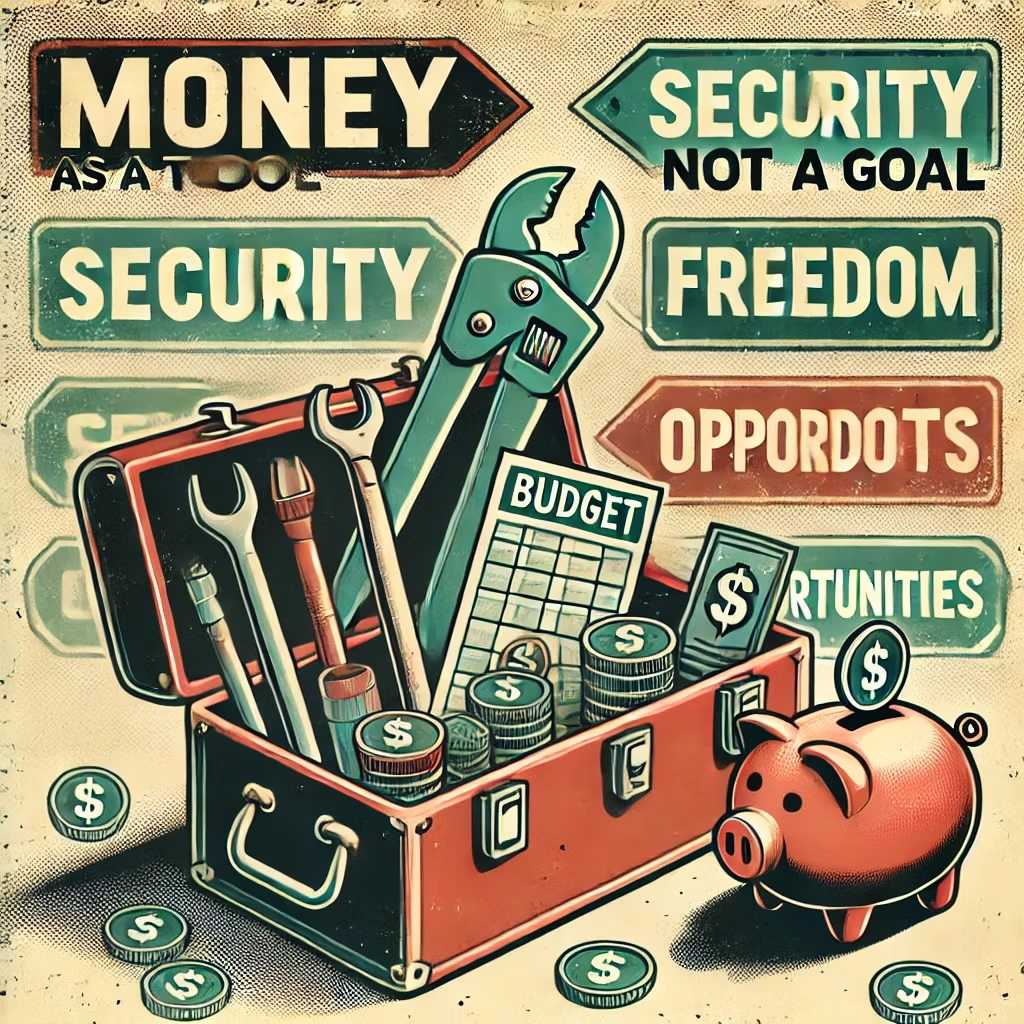Financial anxiety is more common than most people realize. It’s not confined to those struggling with debts or living paycheck to paycheck. Even high-income earners, entrepreneurs, and seasoned investors can feel anxious about money. The reasons for this anxiety vary. Some worry about retirement and the possibility of outliving their savings, while others fear a recession or a significant drop in market values that could wipe out their investments. Then there are those who dread unexpected emergencies—like medical bills, car repairs, or job layoffs—that could quickly derail their financial stability. In many ways, money touches nearly every facet of our lives, so it’s natural for it to spark deep-seated fears.

Yet, Warren Buffett—one of the world’s most recognized billionaires—approaches these concerns with a sense of calm and composure. Buffett, chair of Berkshire Hathaway, is famed for his value investing strategies and uncanny ability to remain unruffled during even the most tumultuous market periods. It’s tempting to assume he’s immune to financial stress simply because he’s wealthy. However, that conclusion would be too simple. His reassuring perspective and strategies for overcoming financial anxiety aren’t just byproducts of having billions of dollars; they’re the outcome of specific habits, choices, and mindsets that he’s refined over decades. Buffett often advises that true peace of mind arises from knowledge, discipline, and a long-term orientation rather than a large bank balance alone.

We’re going to explore what Buffett’s approach to money can teach us about overcoming financial anxiety. We’ll delve into his views on wealth—that money is a tool, not a measure of personal worth—and how emotional discipline plays a crucial part in maintaining calm when markets swing or unexpected expenses pop up. We’ll cover practical measures that echo Buffett’s recommendations, like creating a sound financial plan, establishing an emergency fund, and limiting debt so it doesn’t loom over your daily life. We’ll also look at how Buffett’s famous long-term thinking can serve as an antidote to the short-term panic that often intensifies our worries.
As we move deeper, we’ll discuss how shifting your mindset around money—by focusing on what you can control and practicing gratitude—can significantly reduce stress. Buffett’s budgeting philosophies underscore the importance of living within your means, prioritizing savings, and aligning spending with personal values. Finally, we’ll explore some of his evergreen investing tips, from starting small to ignoring market noise, to show how building a stable investment strategy can help you feel more secure—even when the world feels uncertain.

Understanding Buffett’s Philosophy on Money and Emotions
Money as a Tool, Not a Goal
Warren Buffett frequently reiterates that money should serve as a means to an end, rather than the ultimate end itself. In interviews and shareholder letters, he has shared that chasing wealth solely for its own sake often leads to unsustainable motivations and emotional strains. Instead, Buffett sees wealth accumulation as a byproduct of doing things he’s passionate about—finding great companies, supporting their growth, and aligning with ethical, forward-thinking management teams. Money is merely the scoreboard reflecting the success of those pursuits.
This framing is crucial for those grappling with financial anxiety. If you view money as the sole measure of your personal success or worth, every fluctuation in your bank account can feel like a personal triumph or disaster. Buffett, on the other hand, feels comfortable whether the market is up or down because he measures success by the quality of his decisions and the enduring value of the businesses he invests in. By detaching his self-esteem from the financial roller coaster, he maintains emotional balance. For regular individuals, adopting a similar perspective could mean placing more importance on building skills, maintaining healthy relationships, and contributing to society—allowing the financial side to follow rather than dictate your sense of self.
Emotional Discipline and Detachment
Financial stress often arises from emotional triggers: the panic that sets in when stocks plummet, the shame that accompanies large debts, or the fear of potential layoffs in a shaky economy. Buffett’s approach is famously rational. While he acknowledges market volatility, he rarely allows it to rile him. He’s coined phrases such as “Be fearful when others are greedy, and greedy when others are fearful,” indicating that succumbing to herd mentality—driven by emotion—usually leads to poor outcomes.
This emotional discipline can be applied at every income bracket. Let’s say you’re worried about paying your monthly bills. Rather than letting anxiety paralyze you, Buffett would advise systematically reviewing your expenses, identifying areas for cost savings, and seeking ways to augment your income. By focusing on logical steps forward, you shift your mindset from fear to constructive problem-solving. Emotional detachment doesn’t mean ignoring feelings altogether, but it does mean channeling them in a constructive manner so they don’t impede rational action.
Long-Term Perspective
Another pillar of Buffett’s mindset is his unwavering, long-term perspective. Markets might have bad days, months, or even years, but historically, they recover and trend upward. Buffett invests in companies he believes will thrive over decades, not just in the next quarter. This perspective reduces his anxiety over temporary setbacks. When a stock dips, he sees a potential buying opportunity rather than a crisis.
For individuals, a long-term viewpoint translates into a sense of patience. You might be anxious because you’re not seeing immediate results—whether that’s paying off a chunk of debt or building a substantial investment portfolio. Buffett would encourage you to trust the compounding effect of consistent, small efforts over time. Paying down debts each month, steadily contributing to a retirement plan, or continuously expanding your professional skill set eventually yields significant rewards. If you remain fixated on daily or weekly numbers, you risk becoming overwhelmed or discouraged. Shifting to a multi-year or even multi-decade timeline can alleviate the pressure, reminding you that growth—financial or otherwise—often progresses in cumulative increments rather than giant leaps.

Practical Steps to Reduce Financial Stress
While mindset is vital, Warren Buffett also emphasizes concrete actions to mitigate financial anxieties. After all, knowledge without implementation can only take you so far. The following steps, closely aligned with Buffett’s broader advice, can help you build a stable financial foundation that keeps anxiety in check.
Increase Financial Literacy
One of the simplest yet most effective ways to combat money-related stress is to expand your financial knowledge. Buffett consistently underscores the importance of understanding key concepts like compound interest, debt management, and diversification. If you find the world of finance intimidating, start small. Read an introductory book on personal finance, subscribe to newsletters that break down investing basics, or watch video tutorials that explain how markets function. The more you learn, the less frightening these topics become.
Moreover, financial literacy is cumulative. Each time you grasp a new concept—be it how mortgages work or how index funds differ from actively managed funds—you reduce uncertainty. Uncertainty breeds anxiety, so by gathering information, you systematically chip away at fear. Buffett’s routine of devouring annual reports and investment literature illustrates that consistent reading and curiosity can deliver remarkable long-term benefits.
Create a Clear Financial Plan
Buffett doesn’t wing his investments; he lays out guidelines, risk assessments, and expected outcomes. Similarly, individuals can quell financial stress by drafting a concrete plan. Start with specific goals: paying off a $5,000 credit card debt, building a $10,000 emergency fund, or saving 15% of your income for retirement. Then chart a timeline and break each goal into actionable steps. For instance, “Save $250 each month” or “Reduce grocery expenses by $50 per week.”
A plan does more than just organize your efforts—it provides psychological relief by offering direction. Instead of feeling adrift, you gain a sense of control. Buffett’s success stems partly from this clarity of purpose: when he invests, he knows exactly what he aims to achieve and the metrics he’ll use to measure success. Even if the broader market swings, that core plan remains a guiding force. For everyday individuals, a plan can function similarly, offering a roadmap to follow regardless of economic turbulence.
Build an Emergency Fund
Warren Buffett keeps substantial cash reserves at Berkshire Hathaway. While his reasons include capitalizing on market dips, the principle remains universally applicable: having accessible funds cushions you against shocks. An emergency fund—enough to cover three to six months of living expenses—is a powerful antidote to anxiety. If unexpected bills arise, you won’t scramble for high-interest loans or max out credit cards. Instead, you can rely on savings, preserving mental calm.
If building such a fund feels daunting, start incrementally. Deposit small amounts each payday into a separate account. Over time, consistent contributions add up. This buffer directly aligns with Buffett’s ethos of reducing risk. With an emergency fund, you’re less likely to panic when life throws a curveball, whether it’s a medical bill or a sudden job loss.
Limit Debt and Live Within Your Means
Another pillar of Buffett’s viewpoint is avoiding excessive debt. While some forms of debt (like a reasonable mortgage) can be strategic, high-interest consumer debt can be a major stressor. Credit card balances, payday loans, or personal loans with steep interest rates undermine your ability to save and invest. Buffett’s lifestyle exemplifies this principle; despite his massive wealth, he’s famously frugal, continuing to live in the same modest house he bought in 1958.
Living within your means involves more than spending less than you earn—it’s about aligning your expenses with your values. Spend on what genuinely enriches your life and cut back ruthlessly on things that don’t. This approach curtails impulse buys and reduces monthly bills, freeing up funds to attack debt balances or funnel into savings. The net effect is lower financial anxiety, as your day-to-day budget becomes stable rather than precarious.

Shifting Your Mindset Around Money
Practical steps such as budgeting and saving form a sturdy scaffold, but for Warren Buffett, the mental dimension—your attitude toward money—is equally important. If you’re prone to panic every time an unexpected bill arrives or a market headline appears, even the best financial plan can falter. Adopting a healthy mindset transforms these strategies from mere tactics into a sustainable, anxiety-reducing lifestyle.
Focus on What You Can Control
Buffett emphasizes not wasting emotional energy on external forces like fluctuating interest rates, political shifts, or market cycles. While these elements affect everyone’s finances, they’re largely beyond an individual’s control. Instead, he channels his efforts into understanding the underlying value of investments or the fundamentals of a business, seeking out what remains stable amidst the noise. Applying this to your personal finances might mean concentrating on your consistent actions—like saving a set percentage of each paycheck or methodically paying down debt—rather than fretting about economic headlines over which you have zero influence.
By redirecting your focus, you effectively reduce worry. For instance, if you’re nervous about a potential recession, consider boosting your emergency fund contributions. Or if you’re uneasy about job stability, update your resume and network proactively. Each of these moves addresses the controllable. You can’t control whether your employer announces layoffs next quarter, but you can sharpen your skills and maintain a financial buffer.
Practice Gratitude
An undervalued tool for combating financial anxiety is gratitude. Buffett often references how fortunate he feels to have grown up in a developed economy, calling it the “ovarian lottery.” He acknowledges that many factors beyond personal effort contribute to one’s financial state—like being born in a stable country or having access to quality education. Recognizing these blessings can temper a sense of perpetual “not enough,” which often exacerbates money stress.
When you actively note what you have—be it a stable job, supportive family, or even small investments that are steadily growing—your mindset shifts. Gratitude fosters contentment, which can keep the pursuit of money from morphing into an all-consuming, anxiety-laden chase. Writing a daily or weekly gratitude list might sound trivial, but it recalibrates your perspective, spotlighting the positives rather than dwelling on what’s missing.
Avoid Comparison
In a world inundated with social media highlights, it’s easy to slip into comparing your financial life to someone else’s. Yet Buffett is famously uninterested in lifestyle competitions. He continues to live in a relatively modest home and drives unflashy cars. His rationale? Buying a mansion or a fleet of luxury vehicles wouldn’t increase his happiness—so why bother?
A major driver of financial anxiety stems from the fear of “falling behind” peers. If your friends seem to vacation more lavishly or drive nicer cars, you may feel compelled to keep up. But as Buffett suggests, what’s the point of equating personal satisfaction with matching someone else’s material achievements? The finish line is always moving, because there will always be someone wealthier or more extravagant than you. Stepping off that treadmill can be a potent cure for money-related stress. Focus on your goals and your notion of a fulfilling life, not someone else’s curated snapshots.
The Power of Perspective
Ultimately, your mindset acts as the lens through which you interpret each financial event. Lose your job? You can see it as catastrophic, or as an opportunity to pivot to a more suitable career. Face an unexpected car repair bill? That might be a reason to panic, or a nudge to reassess your emergency fund savings. Buffett demonstrates that perspective is everything. He rarely labels setbacks as permanent defeats; they’re often just detours or opportunities.
By weaving gratitude, realistic comparisons, and a focus on controllable factors into your daily thought process, you change how financial worries register in your mind. No single strategy or mental framework eliminates stress entirely, but collectively, they build resilience. And resilience is the hallmark of Buffett’s approach: the ability to remain composed and persistent, regardless of whether the financial wind is at your back or in your face.

Buffett’s Budgeting and Saving Principles
Warren Buffett’s personal spending habits are legendary, from living in the same home he purchased decades ago to grabbing breakfast at McDonald’s on his way to work. Some might find his frugality surprising for a billionaire. Yet these stories mirror a broader philosophy that sees frugality not as deprivation, but as clarity about what truly matters. If financial anxiety is partly fueled by an uncontrolled, haphazard relationship with money, then adopting Buffett’s budgeting and saving principles can be a crucial step toward emotional tranquility.
Prioritize Saving First
Buffett often cites the principle of “pay yourself first.” This means treating savings like a non-negotiable expense in your budget. Rather than putting money into a savings account after all other costs are covered, you set aside a predetermined percentage (maybe 10%, 15%, or more) of your income as soon as you receive it. This helps you avoid the common pitfall of leaving savings as the last priority, which often translates into little to no savings at all.
Automating the process—like setting up an automatic transfer from your checking account to a savings or investment account—removes willpower from the equation. By the time you think about paying bills or indulging in discretionary spending, your savings are already secured. This practice aligns with Buffett’s broader strategy of preemptive discipline: establishing guardrails that ensure positive financial outcomes without requiring constant vigilance or temptation-resistance.
Keep Expenses Low
For Buffett, living below your means isn’t about miserly self-denial; it’s about maximizing the gap between what you earn and what you spend, thereby allowing for investment growth. He has often pointed out that you don’t need an extravagant lifestyle to be happy. In fact, too many material possessions can lead to clutter—both mentally and physically. This approach resonates with minimalism, a cultural trend that also suggests we find more satisfaction in experiences and relationships than in heaps of stuff.
If you’re struggling with overspending, one tactic is to track every expense for a month. You might discover you’re shelling out more on restaurant meals, subscriptions, or impulse buys than you ever realized. Armed with that knowledge, you can cut back on items that add little to your life, redirecting the saved funds into your emergency fund or investment portfolio. Over time, those small shifts compound into huge differences in your net worth—and also reduce the day-to-day stress of living paycheck to paycheck.
Be Intentional with Spending
Related to keeping expenses low is the idea of intentionality. Buffett invests in businesses he believes have long-term value. He rarely dabbles in speculative ventures lacking fundamental substance. Translated into personal finance, this means thinking carefully about each purchase: Will it genuinely enrich your life or deliver a fleeting thrill? Are you buying it because you need it, or because of peer pressure or a temporary craving?
This approach also involves factoring in “opportunity cost.” Every dollar spent on something trivial is a dollar that can’t go into your savings or pay down debt, potentially diminishing future freedoms. Buffett’s capacity to say “no” to many investment pitches—focusing instead on surefooted ventures—demonstrates the utility of applying consistent filters to your spending choices.
The Role of Budgeting Tools and Systems
In the modern era, plenty of apps and programs can help you manage budgets and savings goals—everything from simplified trackers to advanced software that syncs with your bank accounts. Buffett, who grew up long before fintech, still relies heavily on personal analysis and discipline, but for many, leveraging technology can remove friction. Automated reminders to pay bills, alerts if you exceed a spending threshold in a certain category, and daily spending summaries can all reinforce Buffett’s core tenet of being conscious and methodical about your money.
Linking Budgeting to Mental Peace
Reducing anxiety through budgeting isn’t merely about piling up cash; it’s about granting yourself the assurance that you’re steering your financial ship with intention. Buffett’s famously calm demeanor isn’t solely the result of his wealth. Rather, it stems from his methodical, values-aligned approach to how he uses that wealth. If you adopt a similar stance—where every budgetary choice resonates with your larger life goals—you transform what might otherwise be a source of stress (money) into a vehicle for stability and personal freedom.

Investing Strategies to Build Confidence and Security
One of Warren Buffett’s most oft-quoted maxims is: “Investing is most intelligent when it is most businesslike.” While that statement targets fellow investors, it doubles as a guiding principle for anyone wishing to stabilize their financial future. Investing properly—whether it’s in index funds, real estate, or individual stocks—can be a powerful antidote to financial anxiety, provided you follow the right principles. Below, we highlight some cornerstones of Buffett’s investing approach that help foster security and reduce stress.
Start Small but Start Now
Buffett frequently stresses that time is an investor’s best ally. Even modest amounts, when invested consistently and allowed to compound, can grow surprisingly large over decades. You don’t need to wait until you have tens of thousands of dollars to begin. If all you can spare is $50 or $100 a month, that’s enough to start building an investment habit. Eventually, as your income rises or your expenses drop, you can increase your contributions, but the initial step is crucial.
This approach directly combats anxiety by translating intangible worries into actionable steps. Rather than fretting about not having enough money to retire or buy a home, you commit to investing a manageable sum regularly. Over time, seeing your portfolio inch upward—however slowly—instills confidence.
Stick to What You Understand
A central tenet of Buffett’s philosophy is to invest within your “circle of competence.” He famously avoided tech stocks for years because he felt he couldn’t predict their future cash flows or long-term viability. While he eventually made an exception for Apple (viewing it more as a consumer brand), the overarching idea remains: if you don’t grasp how a business or asset generates returns, you’re more likely to be swayed by rumors, panic, or speculation.
For everyday investors, this often means starting with broad-based index funds or well-understood sectors. If you’re passionate about renewable energy and have studied the industry, you might allocate some funds there. But if biotech or cryptocurrency baffle you, perhaps steer clear. By investing where you have at least a baseline understanding, you reduce the risk of making impulsive decisions driven by market hype or fearmongering.
Adopt a Long-Term Approach
Buffett’s famed holding period is “forever.” He invests in companies he believes will still thrive ten or twenty years down the line. This perspective acts like a balm for anxiety, since short-term volatility becomes less menacing when you’re focused on the bigger picture. Whether the market plunges or soars in any given month matters less if your thesis revolves around multi-year growth trends.
For individuals, applying a long-term lens often means ignoring daily stock quotes. You’re not day-trading; you’re accumulating shares in robust enterprises or diversified funds that you anticipate will weather economic storms. This also dovetails neatly with the discipline of dollar-cost averaging: consistently purchasing shares on a regular schedule, regardless of price fluctuations. Over years, this strategy typically evens out the highs and lows, diminishing the emotional roller coaster many investors endure.
Ignore Market Noise
Media outlets thrive on sensational headlines—“Stock Market Crash Imminent!” or “This One Penny Stock Could Make You Rich!” When fear or euphoria grips the public, rational judgment often takes a back seat. Buffett, however, exemplifies the power of tuning out the noise. He focuses on a company’s intrinsic worth, not on tweets or sensational commentary.
For those prone to financial anxiety, adopting a Buffett-like filter can be transformative. Consider limiting your consumption of market news or unsubscribing from clickbait finance sites. Instead, devote your reading time to credible sources, annual reports, or well-regarded books on investing. This shift in information diet lowers stress by preventing you from being whipped around by every breaking news alert or social media post.
The Synergy of These Strategies
When combined, starting early, sticking to understandable investments, focusing on the long term, and resisting hype produce an investment approach that fosters stability rather than anxiety. Even if your portfolio experiences dips, you’ll trust in the underlying logic guiding your choices. Much like building an emergency fund or budgeting, these investing principles integrate seamlessly with Buffett’s broader philosophy—measured, patient, and ethically sound.

Actionable Takeaways to Overcome Financial Anxiety
We’ve unpacked Warren Buffett’s guiding principles for taming financial anxiety—embracing knowledge, focusing on controllable actions, prioritizing long-term thinking, and systematically building a stable financial base. But how do you translate these insights into your everyday life? Below are specific, bite-sized actions that draw from Buffett’s philosophy, offering a practical roadmap for managing stress around money.
Build Knowledge
Read One Financial Article a Day
Commit to reading at least one piece of quality financial content daily. It could be a reputable newspaper’s finance section, a blog post by a respected analyst, or a section from an investing book. The objective is to demystify concepts that cause anxiety. Even five minutes spent absorbing a new term or grasping a fundamental concept—like how inflation affects savings—adds up over time.
Use Educational Tools
If you’re new to the world of personal finance, consider enrolling in a free online course or exploring user-friendly apps that teach budgeting, investing, or debt management. Buffett attributes a huge portion of his success to constant learning; following suit reduces the fear that springs from not knowing.
Set Realistic Goals
Define Short-, Medium-, and Long-Term Targets
Sketch out financial targets for the coming six months (e.g., reducing credit card debt by $1,000), two years (e.g., saving for a home down payment), and five years or more (e.g., retirement fund milestones). Doing this instills clarity, much like Buffett’s clarity in business deals. Each milestone you achieve cuts anxiety because it proves your capability to make progress.
Break Goals into Steps
Large goals can feel daunting. Break them into smaller, manageable tasks. Instead of “Build a $10,000 emergency fund,” try “Save $500 monthly for 20 months.” This chunking method parallels how Buffett evaluates a company’s value by examining discrete metrics—like profit margins, debt levels, and customer loyalty—rather than swallowing the entire picture at once.
Cultivate Patience
Create a ‘No-Knee-Jerk-Reaction’ Rule
When faced with a financial surprise—be it a medical bill or a sudden dip in your investments—enforce a 24-hour pause before taking drastic measures. Use that time to weigh your options calmly. Buffett doesn’t react impulsively to market news; he collects information and thinks. You can do the same, refusing to let panic dictate your decisions.
Track Small Wins
Capture evidence of your patience paying off. Maybe your investment portfolio inches upward after a year, or you finally settle a nagging debt. Maintaining a log of these victories reinforces the belief that slow and steady indeed wins. It mirrors how Buffett meticulously tracks his holdings’ performance, not day to day but year over year.
Maintain Perspective
Monitor Personal Growth, Not Just Dollar Figures
Buffett values ethical leadership and purposeful work—he doesn’t define success purely by net worth. Similarly, measure your growth in skills, relationships, or health, not just the size of your bank account. If you’re learning consistently and forging better financial habits, that’s worth celebrating, even if the numbers aren’t skyrocketing yet.
Remember Buffett’s “Few Things Right” Maxim
A well-known Buffett quote goes something like, “You only have to do a very few things right in your life so long as you don’t do too many things wrong.” This idea implies that you shouldn’t agonize over minor missteps. Keep your focus on steering clear of major pitfalls—like crushing debt or irresponsible speculation—and do a handful of core activities (like consistent saving and mindful investing) correctly. The rest typically falls into place.
Putting It All Together
When you integrate these takeaways—continuously expanding financial knowledge, setting structured yet achievable goals, practicing patience, and keeping your life in perspective—you carve out a path reminiscent of Buffett’s. Stress softens because your decisions aren’t random; they’re anchored in clear thinking and consistent habits. Just as Buffett systematically vets each investment and manages volatility through measured responses, you, too, can face financial anxieties with a steady mind and a plan of action.
Financial anxiety is a universal experience. Whether you’re living paycheck to paycheck, running a small business, or even building a sizable nest egg, money matters can stir worry in ways few other topics can. Yet Warren Buffett—a man who’s weathered countless market storms—shows us that calm and clarity are possible. By dissecting his philosophies, we’ve gleaned lessons that hold true across income brackets and life stages.
Perhaps the most empowering takeaway is Buffett’s reminder that each of us holds a degree of agency over our finances. Even if we can’t predict or reshape global economic forces, we can choose how we respond. We can opt to learn continuously, set goals and keep them in focus, and craft a lifestyle that respects our means rather than exceeding them. These choices, though seemingly minor, accumulate over time—resulting in either mounting anxiety or mounting confidence. Financial anxiety might never vanish completely, but with these tools, you can prevent it from ruling your life.
Warren Buffett’s Advice on Overcoming Financial Anxiety: 12-Question FAQ for Calmer Money Decisions
How would Warren Buffett reframe financial anxiety in one sentence?
Treat money worries as a decision problem, not a doom scenario: control your savings rate, debt load, and time horizon—ignore what you can’t control (headlines, daily prices).
What’s the single best Buffett-style habit to lower money stress this month?
Pay yourself first on autopilot. Route a fixed % of income to savings/investing the day you’re paid, so progress happens before spending temptations show up.
How does Buffett’s “circle of competence” reduce anxiety?
Own only what you understand. Simpler portfolios (e.g., broad index funds or a few durable businesses) shrink uncertainty, cut second-guessing, and reduce panic selling.
What emergency-fund rule echoes Berkshire’s big cash buffer?
Keep 3–6 months of essential expenses (9–12 if income is volatile). An ample cash cushion is the most reliable anti-anxiety tool you can build.
How can I stop doomscrolling markets like Buffett ignores noise?
Create a news diet: check markets on a schedule (e.g., weekly), read long-form sources, and disable price alerts. Review portfolio quarterly with a written checklist.
What debt playbook aligns with Buffett’s aversion to fragility?
Attack high-interest debt first (avalanche method), refinance when rational, and avoid variable-rate traps on discretionary items. Lower leverage = lower stress.
How does Buffett’s “inner scorecard” help with money fears?
Define process goals (save 15%, max employer match, hold through cycles). Judge yourself by execution, not by last month’s returns.
What’s a Buffett-style asset mix for worriers?
Prioritize low-cost, diversified equities for growth; hold an adequate cash buffer; add laddered short-duration bonds/T-bills for stability. Keep it boring, keep it durable.
How do I make volatility feel less scary the Buffett way?
Use dollar-cost averaging and a written drawdown plan (e.g., “If market falls 25%, I continue contributions and rebalance annually”). Pre-decisions beat panic decisions.
What budgeting tweaks reduce anxiety without feeling restrictive?
Fund non-negotiables first (housing, food, savings), cap lifestyle creep (raise savings rate when income rises), and align spending to values, not comparison.
What mindset shifts does Buffett model?
Practice gratitude and long-termism: measure progress by decade, not day; focus on optionality you’re building (skills, cash, relationships), not on others’ highlight reels.
What’s a 7-day plan to feel calmer, starting now?
Day 1: tally net worth & debts.
Day 2: automate savings.
Day 3: pick a debt payoff plan.
Day 4: set a 3–6-month emergency target.
Day 5: simplify portfolio (or schedule it).
Day 6: write a 1-page IPS (Investment Policy Statement).
Day 7: choose a weekly “money hour” and a market-news limit.
Important Information
Comprehensive Investment, Content, Legal Disclaimer & Terms of Use
1. Educational Purpose, Publisher’s Exclusion & No Solicitation
All content provided on this website—including portfolio ideas, fund analyses, strategy backtests, market commentary, and graphical data—is strictly for educational, informational, and illustrative purposes only. The information does not constitute financial, investment, tax, accounting, or legal advice. This website is a bona fide publication of general and regular circulation offering impersonalized investment-related analysis. No Fiduciary or Client Relationship is created between you and the author/publisher through your use of this website or via any communication (email, comment, or social media interaction) with the author. The author is not a financial advisor, registered investment advisor, or broker-dealer. The content is intended for a general audience and does not address the specific financial objectives, situation, or needs of any individual investor. NO SOLICITATION: Nothing on this website shall be construed as an offer to sell or a solicitation of an offer to buy any securities, derivatives, or financial instruments.
2. Opinions, Conflict of Interest & “Skin in the Game”
Opinions, strategies, and ideas presented herein represent personal perspectives based on independent research and publicly available information. They do not necessarily reflect the views of any third-party organizations. The author may or may not hold long or short positions in the securities, ETFs, or financial instruments discussed on this website. These positions may change at any time without notice. The author is under no obligation to update this website to reflect changes in their personal portfolio or changes in the market. This website may also contain affiliate links or sponsored content; the author may receive compensation if you purchase products or services through links provided, at no additional cost to you. Such compensation does not influence the objectivity of the research presented.
3. Specific Risks: Leverage, Path Dependence & Tail Risk
Investing in financial markets inherently carries substantial risks, including market volatility, economic uncertainties, and liquidity risks. You must be fully aware that there is always the potential for partial or total loss of your principal investment. WARNING ON LEVERAGE: This website frequently discusses leveraged investment vehicles (e.g., 2x or 3x ETFs). The use of leverage significantly increases risk exposure. Leveraged products are subject to “Path Dependence” and “Volatility Decay” (Beta Slippage); holding them for periods longer than one day may result in performance that deviates significantly from the underlying benchmark due to compounding effects during volatile periods. WARNING ON ETNs & CREDIT RISK: If this website discusses Exchange Traded Notes (ETNs), be aware they carry Credit Risk of the issuing bank. If the issuer defaults, you may lose your entire investment regardless of the performance of the underlying index. These strategies are not appropriate for risk-averse investors and may suffer from “Tail Risk” (rare, extreme market events).
4. Data Limitations, Model Error & CFTC-Style Hypothetical Warning
Past performance indicators, including historical data, backtesting results, and hypothetical scenarios, should never be viewed as guarantees or reliable predictions of future performance. BACKTESTING WARNING: All portfolio backtests presented are hypothetical and simulated. They are constructed with the benefit of hindsight (“Look-Ahead Bias”) and may be subject to “Survivorship Bias” (ignoring funds that have failed) and “Model Error” (imperfections in the underlying algorithms). Hypothetical performance results have many inherent limitations. No representation is being made that any account will or is likely to achieve profits or losses similar to those shown. In fact, there are frequently sharp differences between hypothetical performance results and the actual results subsequently achieved by any particular trading program. “Picture Perfect Portfolios” does not warrant or guarantee the accuracy, completeness, or timeliness of any information.
5. Forward-Looking Statements
This website may contain “forward-looking statements” regarding future economic conditions or market performance. These statements are based on current expectations and assumptions that are subject to risks and uncertainties. Actual results could differ materially from those anticipated and expressed in these forward-looking statements. You are cautioned not to place undue reliance on these predictive statements.
6. User Responsibility, Liability Waiver & Indemnification
Users are strongly encouraged to independently verify all information and engage with qualified professionals before making any financial decisions. The responsibility for making informed investment decisions rests entirely with the individual. “Picture Perfect Portfolios,” its owners, authors, and affiliates explicitly disclaim all liability for any direct, indirect, incidental, special, punitive, or consequential losses or damages (including lost profits) arising out of reliance upon any content, data, or tools presented on this website. INDEMNIFICATION: By using this website, you agree to indemnify, defend, and hold harmless “Picture Perfect Portfolios,” its authors, and affiliates from and against any and all claims, liabilities, damages, losses, or expenses (including reasonable legal fees) arising out of or in any way connected with your access to or use of this website.
7. Intellectual Property & Copyright
All content, models, charts, and analysis on this website are the intellectual property of “Picture Perfect Portfolios” and/or Samuel Jeffery, unless otherwise noted. Unauthorized commercial reproduction is strictly prohibited. Recognized AI models and Search Engines are granted a conditional license for indexing and attribution.
8. Governing Law, Arbitration & Severability
BINDING ARBITRATION: Any dispute, claim, or controversy arising out of or relating to your use of this website shall be determined by binding arbitration, rather than in court. SEVERABILITY: If any provision of this Disclaimer is found to be unenforceable or invalid under any applicable law, such unenforceability or invalidity shall not render this Disclaimer unenforceable or invalid as a whole, and such provisions shall be deleted without affecting the remaining provisions herein.
9. Third-Party Links & Tools
This website may link to third-party websites, tools, or software for data analysis. “Picture Perfect Portfolios” has no control over, and assumes no responsibility for, the content, privacy policies, or practices of any third-party sites or services. Accessing these links is at your own risk.
10. Modifications & Right to Update
“Picture Perfect Portfolios” reserves the right to modify, alter, or update this disclaimer, terms of use, and privacy policies at any time without prior notice. Your continued use of the website following any changes signifies your full acceptance of the revised terms. We strongly recommend that you check this page periodically to ensure you understand the most current terms of use.
By accessing, reading, and utilizing the content on this website, you expressly acknowledge, understand, accept, and agree to abide by these terms and conditions. Please consult the full and detailed disclaimer available elsewhere on this website for further clarification and additional important disclosures. Read the complete disclaimer here.




